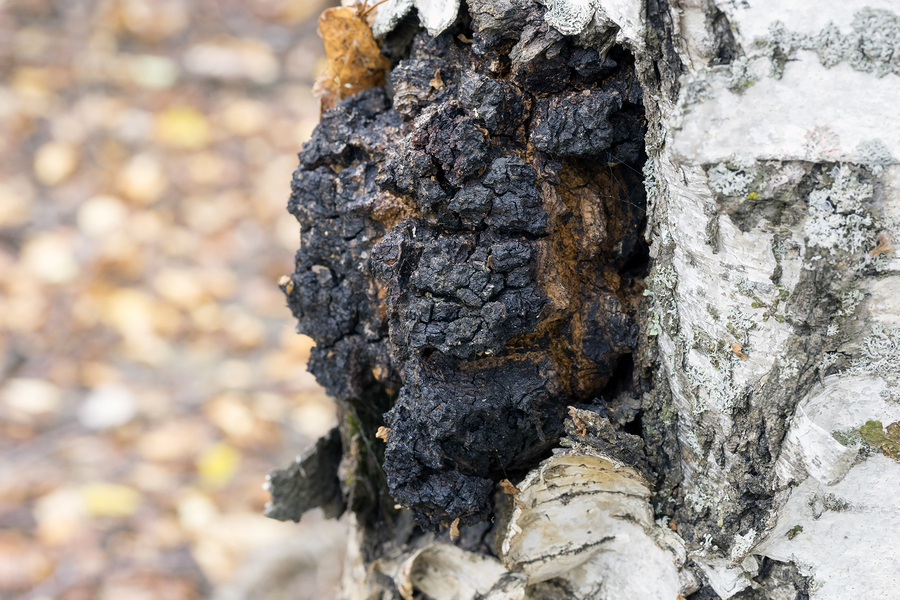If you’ve never heard of mushroom coffee or tea you probably aren’t alone. However, the chaga mushroom, which has been used for centuries, is a superstar loaded with health benefits. It has one of the highest ORAC scores of any food (the higher the “Oxygen Radical Absorbent Capacity” the better a food’s ability to protect the body from disease-causing free radicals) and for that reason, people take it for heart disease, diabetes, liver disease, parasites, stomach pain, and certain types of cancer. 1
Chaga (Inonotus obliquus) is a type of fungus that mainly grows on the outside of birch trees in very cold climates (think Siberia, northern Canada, Alaska, and some northern areas of the continental United States). It’s normally lumpy, with an exterior that looks similar to burnt charcoal and is low in calories, high in fiber and free of fat, sugar, and carbohydrates.
1. Chaga Mushrooms prevent and treat cancer- “According to the Memorial Sloan Cancer Center, ‘Laboratory and animal studies show that chaga can inhibit cancer progression. Studies in humans are needed.’ In fact, in one study, tumor-bearing mice who supplemented with chaga extract experienced a 60 percent tumor size reduction. Meanwhile, mice with metastatic cancer (tumors spread to other parts of the body) had a 25 percent decrease in their number of nodules compared to the control group.” 2
And another study published in the World Journal of Gastroenterology that looked at the effects of chaga mushroom on cancerous human liver cells, the research found that chaga extract might be able to prevent liver cancer cell growth.
2. It stimulates the immune system- In animal studies, chaga has helped boost the immune system “by increasing the production of certain immune cells including interleukin 6 (IL-6) as well as T lymphocytes.” And research on chaga extracts have shown the ability to stimulate spleen lymphocytes, which have a direct and positive effect on immune system function.
3. Chaga is a potent anti-viral- The mushroom seems to have anti-viral abilities with a number of viruses. “Scientific research published in 2015 found that extracts of chaga had an anti-viral affect on human immunodeficiency virus (HIV) type 1. Chaga has also been shown in animal studies to have anti-viral effects when it comes to the hepatitis C virus. Using animal cells, the researchers found that the chaga extract was able to decrease the infective properties of the hepatitis C virus by 100 fold in just 10 minutes.” 3
4. It’s an inflammation reducer- Chaga is also able to reduce inflammation thanks to its ability to “suppress the expression of chemical mediators of inflammation.” 4
5. It improves physical endurance- Animal studies show “significantly improved physical endurance.” In a 2015 study, when mice were given chaga mushroom polysaccharides the mice were able to swim longer.
Chaga mushroom is available as a supplement, tablet, tincture or as coffee or tea (either alone or in combination with other mushrooms such as cordyceps). In coffee form, it’s said to be less acidic and have less caffeine compared to regular coffee.
Check out this recipe for Chaga Mushroom Tea from Dr. Axe or watch the video below: 5
To make chaga mushroom tea, you can use either whole chaga mushroom chunks (roughly 10 grams) or you can grind the chunks into powder using a coffee grinder and use about 2 teaspoons of the powder.
1. Insert the mushroom chunks into a mug or the mushroom powder into a diffuser and into the mug.
2. Pour 1 cup of boiled water into the mug.
3. Let the mushroom chunks/powder steep for 3 minutes.
4. If you would like, you can add a little lemon juice, raw honey or maple syrup to taste.
If you are pregnant or breastfeeding, you should avoid the mushroom because its use has not been studied in pregnant and breastfeeding women. Lastly, there are concerns about chaga and the following conditions:
Rheumatoid arthritis, multiple sclerosis, and lupus- Since chaga is known to make the immune system more active it could lead to increased symptoms of auto-immune disease.
Diabetes — It may decrease blood sugar levels in diabetics.
Bleeding Disorders — May raise the risk of bleeding. For this reason, stop its use two weeks before any type of surgery.












